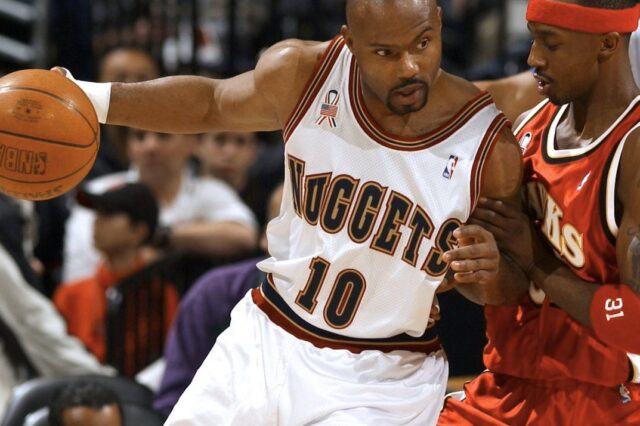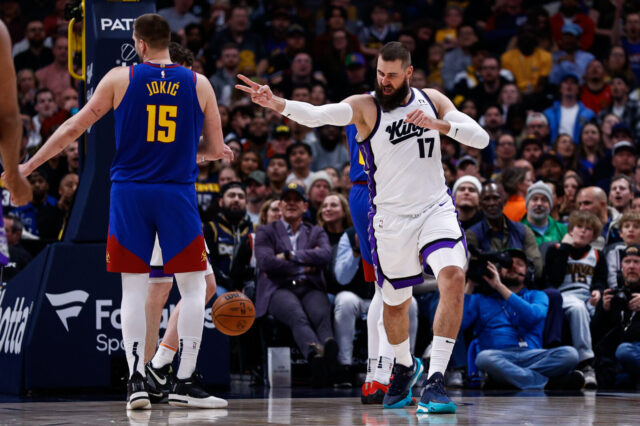The progression of P.J. Dozier within the Denver Nuggets organization happened very quickly. From training camp standout, to emergency point guard, to playoff savior, to do-it-all backup, to missing piece, the last two years of Dozier’s tenure in Denver have been eventful to say the least.
Off the heels of a magical Final Four run in his freshman season with the South Carolina Gamecocks, Dozier declared for the 2017 NBA Draft, hoping to capitalize on the added exposure like so many draft prospects before him. Dozier went undrafted though and ultimately signed a contract with the Dallas Mavericks. He was then cut by Dallas in training camp and signed with Oklahoma City on a two-way contract for the 2017-18 year instead. He barely played, never getting the opportunity he was worth more, and signed a two-way contract with Boston for the 2018-19 season. That didn’t go any better.
On a whim, the Nuggets added Dozier to their training camp roster prior to the 2019-20 season. He worked hard, showcased talent, and played with enough defensive discipline that he won the 17th roster spot and second two-way contract over Tyler Cook in just a couple of October weeks in 2019. This would mark the third straight season of Dozier playing on a two-way contract, and it probably marked his final NBA opportunity before he would have to explore other professional options.
Dozier excelled at the G League level, proving he was above that level of competition after spending multiple years honing his craft. That was never the question about Dozier though. He had played eight games and a combined 54 minutes across two full seasons at the NBA level, and no one knew what he could be at the highest level of competition. The Nuggets were still taking a chance on Dozier, especially since they had no true third point guard on the full-time roster.
And then, in a moment that may have changed Dozier’s professional career forever, Jamal Murray sprained his ankle against the Charlotte Hornets in January of 2020.
I was at this game, and the energy in the building of Dozier excelling off the bench replacing an injured Murray was electric. He immediately responded to the pressure of playing like a veteran, and that poise under pressure, along with his postgame press conference with the Denver media, highlighted his poise and confidence in himself. He wasn’t just a two-way player in his final chance to prove himself but a legitimate NBA caliber guard.
Fast forward through the remainder of the 2019-20 season where Dozier acquitted himself as a competent NBA guard and into the NBA bubble. The Nuggets were immediately hit by COVID-19 protocols that prevented their entire roster from coming together for a significant period of time. Combine that with injuries to Gary Harris and Will Barton, and the Nuggets were in dangerous waters heading into the 2020 postseason against the Utah Jazz. Jamal Murray and Nikola Jokić were rock solid, and Jerami Grant was a solid third option and wing defensive option, but the Nuggets needed more, and they struggled to piece things together until Harris returned for Game 6.
Before then, it was Dozier who was the connecting piece the Nuggets needed to beat the Jazz and their perimeter based offense. Dozier played in between 18 and 22 minutes if four of the first five games of the series, and it was his defensive abilities that gave Denver just enough to outlast the Jazz in Games 1 and 5, next to the heroics of Murray and Jokić of course.
The best characteristic of Dozier’s individual defensive abilities was his smart instincts and positioning. The Nuggets needed a guard/wing defender who would execute their defensive schemes behind the primary action, and Dozier was excellent in rotations, ball denial, and limiting mistakes. Without his contributions, the Nuggets simply lose in five games to the Jazz, and who knows what the team becomes if they never get past the first round in the bubble?
Dozier’s job in the 2020 playoffs was basically done after Harris returned, though he had a brief moment in Game 2 of the conference finals against the Los Angeles Lakers, playing with confidence on the defensive end against LeBron James, Anthony Davis, and the rest of the eventual champions of the bubble. It was a fun game from Dozier and showcased how much value he could offer on the defensive end by being an elite team defender and sacrificing his body.
But that’s basically it for the 2019-20 season. Dozier had done enough to earn an opportunity at a rotation spot for the following season, and the Nuggets converted Dozier to a standard contract BEFORE the bubble even happened.
Heading into the 2020-21 season, Dozier was seen as a candidate for growth and progression following a mini-breakout, and that’s exactly what happened. In 50 games (including six starts) Dozier averaged 21.8 minutes, 7.7 points, 3.6 rebounds, and 1.8 assists per game, respectable averages for a bench wing. And Dozier was definitely playing a wing position, sometimes even power forward, rather than guard for most of the year. Given the addition of Facundo Campazzo, the departure of Jerami Grant, as well as early absences of JaMychal Green and Michael Porter Jr., Dozier spent significant time at backup power forward with the Nuggets playing four guards and a big, a far cry from Dozier’s initial time in Denver’s rotation as a combo guard.
Dozier took the change in stride, letting everyone know that would listen that he would play anywhere and fill any role if it meant getting on the court and helping the team win. He still ultimately spent the majority of his 1,088 minutes played in the 2020-21 season at shooting guard, according to Basketball Reference’s inexact play-by-play data, and his best minutes happened when he played the wing.
There were high level flashes throughout the year. When Dozier generated big point totals, it usually meant that the jumper was working for him. That wasn’t the case the entire season, but there were significant stretches when Dozier showcased a high level of comfort both on and off the ball as a shooter. He navigated through traffic, read the floor, found comfortable spots for assisted and unassisted jumpers, and knocked them down with ease.
Things weren’t perfect. Dozier dealt with two separate injuries that kept him out for a significant period of time. A strained hamstring in the 17th game of the season against the Mavericks held him out for 15 games. When he returned, he shot the ball far less efficiently, though his role was larger across the next 33 games and he played great defense. In his final game of the season against the Los Angeles Lakers just two weeks before the playoffs started, Dozier sustained a significant groin injury that robbed him of playing time in the playoffs, especially given Denver’s already hampered backcourt.
| Season segment | Minutes | Points | Rebounds | Assists | FG% | 3P% | +/- |
|---|---|---|---|---|---|---|---|
| Pre-injury (17 games) | 19.4 | 7.1 | 4.1 | 1.4 | 46.8 | 40.5 | +1.4 |
| Post-injury (33 games) | 23.0 | 8.0 | 3.4 | 2.1 | 39.8 | 28.6 | +5.2 |
Dozier shot the ball more efficiently earlier in the season while playing a lot of small forward and some power forward, though the Nuggets were less successful. When Dozier returned in the middle of the year following his hamstring injury, he wasn’t as efficient himself, but the team was more effective overall. It wasn’t just the case of Dozier being propped up by teammates either. The defensive film highlights Dozier as an excellent team defender who has a high impact on the players around him, and many metrics agree.
The Nuggets missed Dozier’s ability to sit down and guard in the postseason. It wasn’t the reason they lost against the Phoenix Suns, but his absence made rotations sans Jamal Murray borderline impossible. After trading Gary Harris in a deal to acquire Aaron Gordon, the Nuggets were counting on Dozier to fill the void of versatile perimeter defender.
That void hasn’t exactly gone away. Denver’s offseason additions of Bones Hyland and Jeff Green aren’t going to improve Denver’s perimeter defense. There’s only one other player currently on the roster listed between 6’3” and 6’8”: starting shooting guard Will Barton with injury issues of his own. As much as the Nuggets are simply counting on Murray returning to full health this year, they’re also counting on Dozier.
The Nuggets badly need perimeter defense, especially from players connecting Denver’s Big Three of Murray, Jokić, and Michael Porter Jr. together. Surrounding those three incredible offensive players with elite defensive options seems to be the path to success. Aaron Gordon fills the void at the forward position, but the Nuggets always needed another stopper in the backcourt with Harris now gone. Facundo Campazzo, while a bulldog defensively in his own right, is limited by his 5’10” frame. Barton is nearly 31 and will need to focus on offense with Murray out initially. Austin Rivers is a solid defender but doesn’t have the physical tools to be more than that. Jeff Green is probably best used at power forward and center at this point.
It really does come down to Dozier, who suddenly finds himself in a contract year with a significant role awaiting him if he plays his cards right. There’s no reason he can’t be Denver’s Sixth Man while Monte Morris is starting in place of Murray. Dozier’s versatility will allow him to fill in up and down the lineup, and he still has more to show on both ends of the floor.
It’s easy to forget that, for a player that declared for the draft over four years ago, Dozier has played just 87 games and 1,554 regular season minutes. At 24 years old, Dozier is still learning and developing his game, and the best teacher is experience. After playing over 1,000 of his 1,500+ minutes last season, it’s fair to assume that Dozier can still level up if he makes the proper improvements. Confidence with the ball in his hands and in the outside jumper will go a long way in proving he’s a sustainable rotation player at the highest level. Becoming the best perimeter defender he can be will ensure that the Nuggets can always go to him in a moment of need.
You can never have too many wings in the modern NBA. Unfortunately, the Nuggets really only have two in Barton and Dozier. Both will be important to Denver’s success, and if Dozier proves he can elevate his game, he will be in line for a big payday.
Hopefully, it comes from the Nuggets following a deep playoff run next year.


